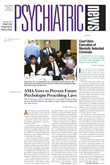Do you enjoy an academic atmosphere but wonder whether you have to do clinical trials or animal research to be an academic psychiatrist? Are you thinking of an academic career as an educator but are not sure exactly what that entails? Does the thought of producing a new idea or “product” that will enhance people’s knowledge excite you?
“If the answer to any of these questions is yes, then the Association for Academic Psychiatry [AAP] is an organization you should join, and you should attend our annual meeting this fall,” said Philip R. Muskin, M.D., immediate past chair of APA’s Scientific Program Committee and the current president of the AAP.
The theme of this year’s meeting is “The Exemplary Educator: Getting There and Getting the Recognition You Deserve.” It will be held at the Hotel Intercontinental in Toronto, Ontario, Canada, from October 2 to 5.
“The death of academic psychiatry has been reported prematurely—sorry, Mr. Clemens—as many psychiatrists are actively engaged in teaching, creating new educational programs, or struggling to make supervision the best possible experience for a trainee. These activities are all part of academic psychiatry.”
The AAP is an international organization devoted to the development of academic psychiatrists. Its annual meeting is the perfect size to foster discussion among colleagues and to establish networking relationships that last for years, said Muskin. Attendees welcome the opportunity to share innovative educational approaches with one another. Several groups have conducted projects that have led to peer-reviewed publications. Groups working together are typically composed of psychiatrists at all levels, from a PGY-4 resident to the chair of a department.
Unfortunately, inadequate attention is focused on academic issues during residency and fellowship training, said Muskin. Postgraduate training in education is available only through professional organizations such as the AAP. Enhancing one’s teaching skills and developing a teaching portfolio is the path to a rewarding career, recognition, and academic promotion.
During the meeting in October, expert academicians will present their academic activities, discuss how they organized the collection of course evaluations, and detail how the material was presented in their departments to obtain an academic promotion. Four examples will be reviewed, focusing on the roles of teacher, clinician, researcher, and administrator.
Symposia topics include developing a teaching portfolio for academic promotion, the creation of a digital video library of clinical vignettes, creating programs for medical students, CME (postgraduate) education, professional writing, the use of standardized patients, and the care and maintenance of voluntary faculty.
In addition, a limited number of participants will have the opportunity for a private videotaped session with a renowned trainer of professional speakers (first come/first served).
As AAP president, Muskin invites psychiatrists who enjoy teaching and supervising to “please consider attending what promises to be an outstanding annual meeting. Tell colleagues who might be interested in the AAP to go to the Web site to find out more about the organization and the meeting.”
More information about the AAP and its 2002 annual meeting is posted on the Web at www.academicpsychiatry.org. ▪
